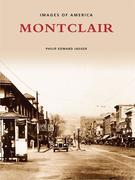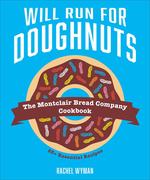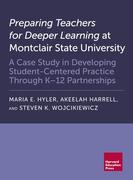79 Results for : montclair
-

-

Will Run For Doughnuts
Will Run For Doughnuts - The Montclair Bread Company Cookbook: ab 12.99 €- Shop: ebook.de
- Price: 12.99 EUR excl. shipping
-

Preparing Teachers for Deeper Learning at Montclair State University
Preparing Teachers for Deeper Learning at Montclair State University - A Case Study in Developing Student-Centered Practice Through K-12 Partnerships: ab 28.99 €- Shop: ebook.de
- Price: 28.99 EUR excl. shipping
-
-
Modern Drummer Festival 2010
On May 22, 2010, the Modern Drummer Festival returned to the Memorial Auditorium at Montclair Ste University in Montclair, New Jersey. Hudson Music was there to capture this historic event as the world's premier drum festival returned to the venue where it all began. The lineup for the 2010 Festival featured world-class drumming artists of all styles: the aggressively complex attack of progressive star Chris Pennie (Coheed & Cambria, Dillinger Escape Plan), a stylistically diverse set from Nashv- Shop: odax
- Price: 23.46 EUR excl. shipping
-
Border Crossings
Border Crossings Performed by members of Pacific Serenades Mark Carlson, flute Gary Gray, clarinet Clayton Haslop, violin (Concierto barroco) Connie Kupka, violin (2nd, Three Folksongs & Pacific Serenade) Miwako Watanabe, violin (1st, Pacific Serenade) Roger Wilkie, violin (1st, Three Folksongs) Roland Kato, viola (Three Folksongs) Simon Oswell, viola (Pacific Serenade) David Speltz, cello Patricia Mabee, harpsichord Joanne Pearce Martin, piano The Music All of these works were commissioned and premiered by Pacific Serenades. Concierto barroco for flute, violin, cello, and harpsichord (2002) Commissioned by Jack & Florence Irving for Pacific Serenades. A few years ago I had the opportunity to read the novel Concierto barroco, written in 1974 by the brilliant Cuban writer Alejo Carpentier (1904-1980). The novel mentions a chance encounter in the city of Venice at the beginning of the 18th Century between three great musicians of the time: Domenico Scarlatti (1685-1757), George Frideric Handel (1685-1759), and Antonio Vivaldi (1678-1741). In an amusing passage, it tells how they get together and play their favorite instruments, Scarlatti at the harpsichord, Handel at the organ, and Vivaldi at the violin, and perform an exceptional jam session. I did borrow the novel's title for my quartet but, in spite of my great admiration for the music of Scarlatti, Handel, and Vivaldi, my intention in Concierto barroco was not to imitate these or other great composers of the 18th century, but rather, to create an original baroque musical style of my own. My objective was not unlike that of the Mexican composer Manuel M. Ponce (1882-1948) in his baroque compositions for guitar, or the Brazilian Heitor Villa-Lobos (1887-1959) in his Bachianas Brasileiras cycle. The compositional process that I undertook involved combining traditional forms of the baroque period, of the Spanish baroque, and modern Latin American dances. -Enrique González-Medina Three Folksongs for clarinet and string quartet (1992) Commissioned by Elizabeth H. Henderson for Pacific Serenades Three Folksongs was composed in 1992, a commission from Mark Carlson and Pacific Serenades. Each of the three movements is centered on a vernacular-styled melody, which is placed in a traditional Western classical form. In the first movement, a Scotch/Irish ballad is contained by sonata form, the second is a theme and variations on an African-American-styled spiritual, the third movement is a Brazilian samba, realized as a rondo. At the time, I was interested to see whether these different 'ethnic' themes could co-exist in a piece without it sounding like a hodgepodge. But if Bach used French, Italian, and German styles incorporated into the distinct movements of a suite, then, I thought, I should be able to do so with Irish, African, and Brazilian music! In the years since composing this piece, my interest in incorporating the vernacular with the classical styles has only deepened and continues to grow. It is how I hear music. My thanks to Mark Carlson for his terrific support and for the unique work that he does in bringing new work into the world. Thanks also to the performers for their artistry and for their passion. -Robert Livingston Aldridge Sonata for cello and piano (1998) Commissioned by Virgil & Lynn Roth for Pacific Serenades As is almost always true with my music, this piece is rather eclectic, various styles being blended and juxtaposed, reflecting my varied musical roots and interests. The opening and closing movements are both rather busy, the first one often agitated and the last an upbeat dance. The middle movement begins and ends in relative calm, though in it's middle section a high singing melody in the cello evolves into a sort of subdued anguish. The third movement deserves special note here, as it is based on a kind of dance and song peculiar to Venezuela, the merengue, which is in 5/8 time. My fascination with this kind of music stems from three trips to Venezuela, during which I began to explore the folk and popular music of this uniquely multi-cultural country. My piece here is not meant to be a replica of the merengue so much as a kind of synthesis of it's rhythms and overall form and my own language. I guess I am sort of a stylistic sponge: music that I hear and am attracted to often gets absorbed into my personal vocabulary. This movement is a further manifestation of my long-standing attraction to South American popular music, and I have a hunch that it will be one of a number of pieces influenced by Venezuelan music. I wrote the piece especially for David Speltz and Joanne Pearce Martin, and they premiered it on a Pacific Serenades concert in 1998. -Mark Carlson Pacific Serenade for clarinet and string quartet (1998) Commissioned by Dr. Eberhardt & Deedee Rechtin for Pacific Serenades Written in 1998, Pacific Serenade is a "peaceful serenade"-a serenade as in: romantic, quasi-improvised music which should be sung at night under the stars. The main "singer" here is the clarinet. In general, the music is extremely quiet, delicate, sensuous, and sentimental. The sensuousness is created by Latin song elements, especially the nostalgic Brazilian folk song, which is at times combined with blues-style melody and harmony. The string quartet has a technically and expressively challenging part, which is not merely the accompaniment to the clarinet, but rather it is responsible for setting the mood in which the clarinet sings. This is my opus 59, and it was commissioned and premiered by Pacific Serenades in Los Angeles in 1998. Of course, the ensemble's name inspired the name of this work, as well as it's mood, since Gary Gray is the clarinetist. In an age of boom boxes, media bombardment of information, and pop culture becoming increasingly aggressive, boisterous, and violent, I felt the need to write just the opposite, to show once more that less is more. Pacific Serenade is published by Peermusic/Theodore Presser. Later, I wrote versions for optional saxophone and piano. -Miguel del Aguila The Composers Composer Robert Aldridge's music, for orchestra, opera, music-theater, dance, solo and chamber ensembles, has been performed throughout the United States, Europe, and Japan. He has received fellowships and awards from the Guggenheim Foundation, the American Academy of Arts and Letters, the National Endowment for the Arts, the New York Foundation for the Arts, the Lila Wallace Reader's Digest Fund, Meet the Composer, and the American Symphony Orchestra League. He was commissioned by Orpheus Chamber Orchestra and the Los Angeles Chamber Orchestra for a clarinet concerto, which was premiered in 2005. His tone poem, Leda and the Swan, a four-orchestra consortium commission, was premiered in 2003. His opera, Elmer Gantry, was given it's full stage world premiere by Nashville Opera in 2007. He holds a Doctorate in Composition from the Yale School of Music, and is Director of the John J. Cali School of Music at Montclair State University, where he is also an Associate Professor of Music Composition/Theory. Composer Mark Carlson's lyrical, emotionally powerful, and stylistically unique music has earned him the admiration of audiences and musicians throughout the United States, Canada, Mexico, and Europe. A versatile composer, his works include art songs, chamber music, choral music, concertos and other large ensemble works, and songs for musical theater. He has been commissioned by the National Shrine in Washington, DC, and the New West Symphony, among other organizations, as well as by many individual performers. One of his CDs, The Hall of Mirrors, was a winner of the Chamber Music America/WQXR Records Awards for 2001. He has taught music theory and composition at both UCLA and Santa Monica College for many years. The Founder and Artistic Director of Pacific Serenades, he is also active as a flutist. Carlson attended the University of Redlands, graduated from CSU Fresno, and received MA and PhD- Shop: odax
- Price: 27.21 EUR excl. shipping
-
Come Creator Spirit: Fedak Plays Fedak at Westmins
The well-known composer Alfred V. Fedak finally has a definitive recording of a dozen of his organ compositions, recorded by Fedak May 15-16, 2008 on the historic E.M. Skinner organ (opus 780, 1929) in Westminster Presbyterian Church in Albany, N.Y. You will want to own it both for the great music included and to listen to this wonderful instrument. Fedak's effectively utilizes the entire 52 ranks on the organ, and the quality recording by engineer Ed Kelly gives you every nuance. Alfred V. Fedak, noted organist and composer, is Minister of Music and the Arts at Westminster Presbyterian Church in Albany, New York, having held previous church positions in New Jersey and Michigan. He is active in the Hymn Society in the United States and Canada and in the American Guild of Organists, having served from 1995-2000 as Director of the National Certification Committee. To date he has published nearly 100 individual compositions including anthems, mass settings, vocal solos, and organ music. He has also composed over 80 hymn tunes which appear in various collections and denominational hymnals, including 'The Alfred V. Fedak Hymnary,' published in 1990, and 'Sing to the Lord No Threadbare Song: New Hymntunes of Alfred V. Fedak,' published in 2001, and 'God of the Future,' published in 2008. Fedak was born July 4, 1953 in Elizabeth, New Jersey. He earned B.A. and B.M. degrees from Hope College, and an M.A. from Montclair State University. A Fellow of the American Guild of Organists he also holds the Guild's Choirmaster Certificate. He is the recipient of numerous prizes in organ performance and composition, including the A.G.O.'s S. Lewis Elmer Award for national high score on Guild exams. History of the Organ Ernest M. Skinner (1866-1960) is considered by many to be the finest pipe-organ builder America has ever produced. His instruments are prized for their rich tonal beauty and exquisite workmanship. In 1929 Skinner installed his Opus 780, a four-manual instrument of 42 ranks, in Westminster Church after a fire the previous year had destroyed the church's roof and interior, including it's original 1863 Johnson organ. The Skinner organ served Westminster Church until 1976, when it was replaced by an electronic organ, due to the church's inability at the time to fund some much-needed repairs. Fortunately the Skinner was not lost, but was moved to the nearby residence of church members Dr. Thomas and Anne Older, who preserved it by installing the Skinner in their home while keeping it tonally intact. When the church's electronic instrument began to fail in the late 1990s, the Olders donated the Skinner back to the church, more than 20 years after it had been removed. In 2000, Westminster engaged Austin Organs, Inc., of Hartford, Conn., to refurbish and re-install the Skinner in it's original chancel location, with the work being completed in May of 2003. The Chancel organ's 1929 stoplist was largely retained, the most significant alterations being a new 4-rank Mixture and 8' Trumpet added to the Great. In addition, a 2' Piccolo replaces a 4' Unda Maris on the Choir, and a new Solo Cor Anglais and Swell Vox Humana (the latter from the old Echo Organ) were added to the Chancel stoplist. The original console was retained and rebuilt, placed on a moveable platform, and fitted with a computerized multiplex switching system and multi-level combination action. The instrument's most striking visual feature is it's Austin 10-rank Antiphonal division situated in the rear gallery. With it's casework designed by the noted British organ architect and author Stephen Bicknell, this division was added to the organ during the 2003 re-installation to support congregational hymn-singing. The organ now encompasses 52 ranks of pipes distributed over it's six divisions. It is tuned and maintained by the L.A. Carlson Company of East Greenbush, N.Y. Since it's return to the church, Skinner's Opus 780 has quickly achieved wide recognition throughout the organ world. Shortly after it's first dedicatory recital, performed by John Weaver (then organist at Manhattan's Madison Avenue Presbyterian Church and head of the organ departments at both the Juilliard School and Curtis Institute), the organ was prominently featured during the 2003 Region II Convention of the American Guild of Organists in a recital given by David Hill, Director of Music at St. John's College, Cambridge, England. The organ was also showcased by the Organ Historical Society during it's 50th Annieversary National Convention in June of 2006. Thomas Murray, Organ Professor at Yale University, performed a recital on the organ during that convention. In describing the event The Diapason praised it as 'a great recital on a great organ!' And not long afterwards, MWHT-FM declared the organ's restoration to be a 'Great Moment in Classical Music.' Westminster Church is a Presbyterian congregation (PCUSA) organized in 1919, the product of the merger of three earlier Albany churches: Second Presbyterian, Third Presbyterian, and State Street Presbyterian, whose 1862 building the present congregation now occupies.- Shop: odax
- Price: 24.10 EUR excl. shipping
-
Modern Drummer Festival 11
The Modern Drummer Festival 2011 took place at Montclair State University in Montclair, New Jersey, and Hudson Music captures all the action on this exciting and educational DVD set. Main stage performances feature Gil Sharone.- Shop: odax
- Price: 24.01 EUR excl. shipping
-
Songs Of Ascension
Meredith Monk, Ellen Fisher, Bruce Rameker, Todd Reynolds Quartet, The M6, Montclair State University Singers, Heather J. Buchanan- Shop: odax
- Price: 19.32 EUR excl. shipping





